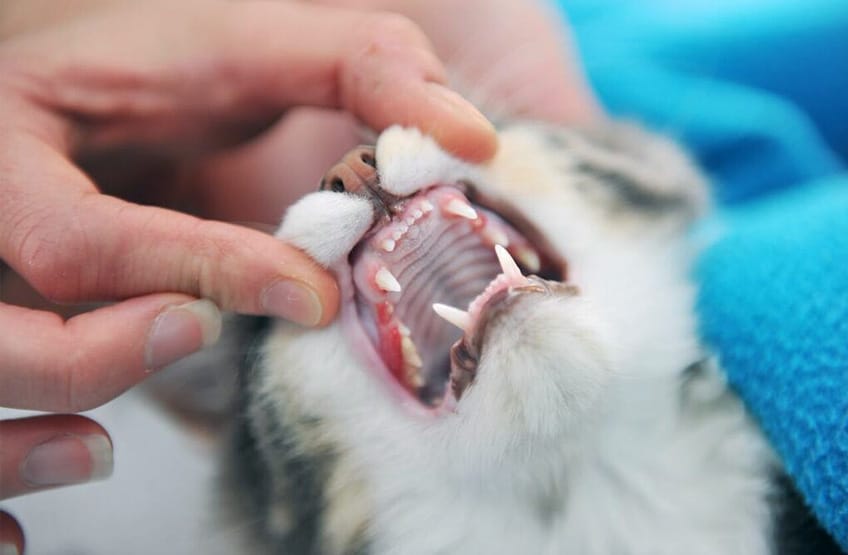The problem is, cats – like all animals that have teeth – are susceptible to gum disease and other dental problems, and they won’t exactly let you know if they’re suffering.
So it’s up to you to look out for the tell-tale signs that your cat’s in pain.
How to tell if your cat has gum disease or dental pain
Your cat may be experiencing dental pain if:
- They’re showing difficulties in eating or chewing
- They’re clawing at their mouth
- They’re not as playful as usual
There’s also a number of signs that may indicate that your cat has gum disease:
- Bad breath and excess salivation
- Swelling, redness, and pus discharge
- Excess tartar build-up
- Loose teeth
- Bleeding
- Stained fur
If you suspect that your cat is suffering from a dental problem, take them to the vet as soon as possible. Vets tend to inspect cats’ mouths as part of their routine examinations. So if anything’s amiss, it’s unlikely to go unnoticed.
How to care for your cat’s teeth
As is always the case when it comes to questions of health, prevention is better than a cure. There’s a number of things you can do to help keep your cat’s teeth clean and healthy. Most dental problems can be avoided almost entirely if you commit to regularly brushing your cats teeth. All good pet shops sell cat finger brushes and toothbrushes, as well as specialist pet toothpaste. And we cannot stress this enough – never use human toothpaste on your cat! Your cat will have to be eased into the teeth-cleaning process.
First they’ll have to get used to the taste of the toothpaste. So for the first few days, simply place a bit of toothpaste on their lips or gums. Next they’ll have to get used to the sensation, so place a little bit of toothpaste onto your brush and move it in a gentle circular motion on the side of their teeth. Gradually increase the length of time you spend doing this – a little bit more each day over the course of a few weeks.
Don’t rush in and don’t overdo it, or your cat may become distressed, which of course will undo all your careful work. Adult cats are generally more resistant to the idea of getting their teeth cleaned. So the earlier you can start the better.
Choosing the right diet for good dental health
Though regular teeth cleaning is the ideal way to prevent dental problems, not all pet owners are prepared to physically brush their cat’s teeth. What’s more, not all cats will take to the idea, no matter how carefully you approach the issue. Luckily, diet can play a huge role in keeping your cat’s teeth and gums clean and healthy.
Dry food is the secret to good dental health. Statistically, cats who are fed on a diet of dry food are less prone to dental problems than cats fed on a diet of wet food. It’s even possible to buy brands of dry food that have been specifically designed to promote good dental health. At Calder Vets we highly recommend Hills Vet Essentials. Raw meat can also help, as it encourages your cat to chew, keeping their bones and teeth strong. Varying the types of meat you feed your cat makes a difference. Fill their diet with a good mix of fish, beef, and rabbit.
Because cats are predators, their natural diet involves lots of hard bones. Indeed, regularly chewing on bones is part of what enables wild cats to maintain good dental health. Giving your cat a bone to chew on can help them to keep their teeth in good shape, but beware of choking hazards. Don’t give them pork, chicken, or fish bones, as they’re likely to splinter. Similarly, go for hard raw bones as opposed to soft cooked bones. Finally, there’s the question of treats. There are certain healthy chews and treats available that are designed to reduce tartar and strengthen gums.
While these are good in moderation, they should not be viewed as the be all and end all of your cat’s teeth cleaning regime. They’re simply supplements to a healthy and varied diet. They also work well as rewards to give to your cats if they behave themselves while having their teeth cleaned.
If you have any more questions about dental care for cats, either talk to your vet, or give us a call on 01924 465 592.



Our Services